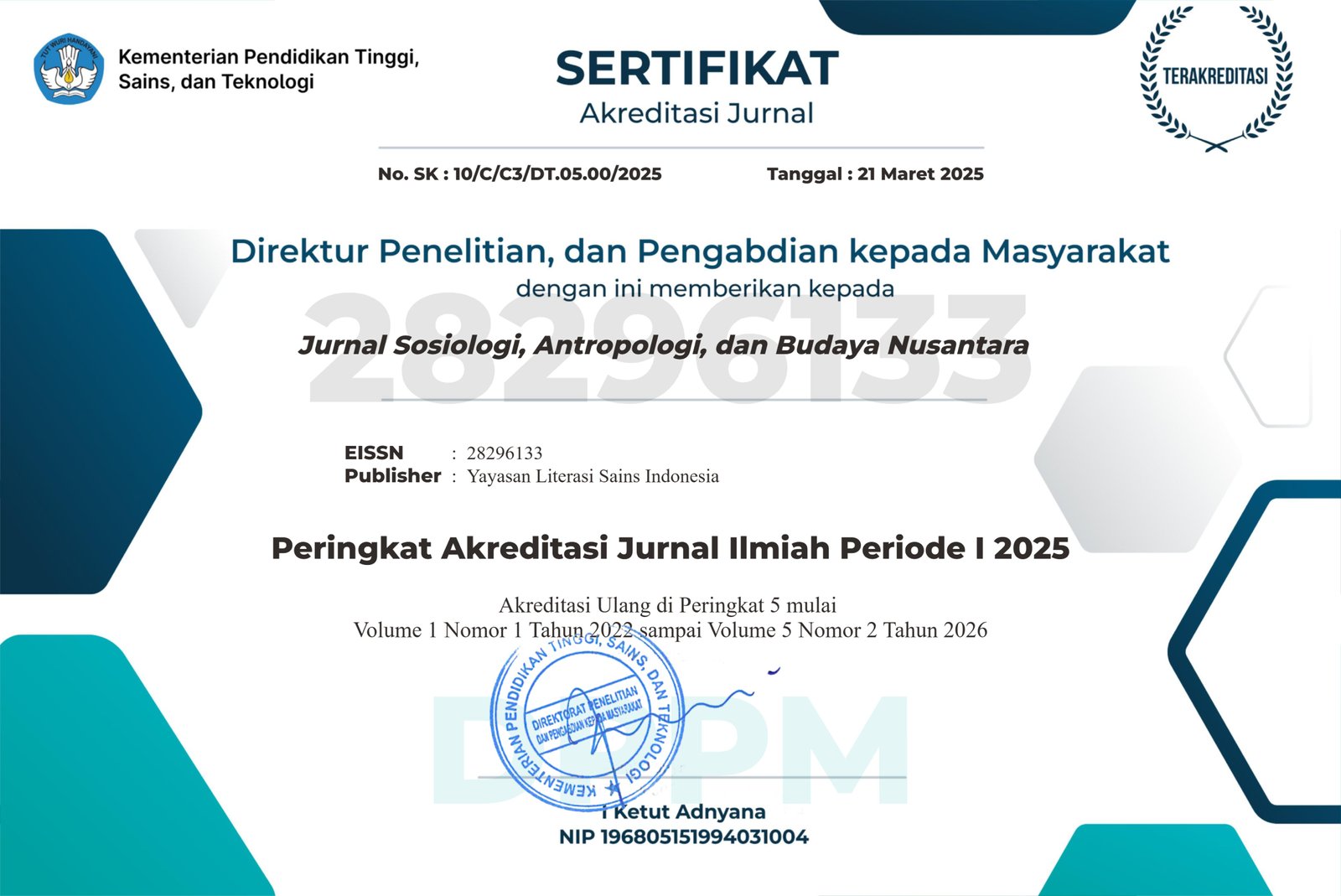MELANGKAH TANPA PENUNTUN: MENGEKSPLORASI DAMPAK KEHILANGAN AYAH TERHADAP KESEHATAN MENTAL DAN EMOSIONAL ANAK-ANAK
DOI:
https://doi.org/10.55123/sabana.v3i2.3488Keywords:
Fatherless, Mental and Emotional Health, Role and FunctionAbstract
The role and function of parents towards children are very important in the family. The absence of one person, especially the father, in guiding and supporting the development of the child will have a direct, unknown impact on a family, as it has a significant impact on the child's health and emotional well-being. Most children unconsciously have problems with the role of a lost father or fatherless in their lives; even Indonesia occupies the third place in the roles of a missing father or fatherless. The study explores the impact of father loss on the child's mental and emotional health, factors that cause fatherlessness, and adaptive strategies to cope with the difficulties that arise after the loss of a father. This research uses a library study method, or literature review, which involves collecting books, articles, and previous research that supports research with a qualitative approach. The results point to the fact that losing a father can have a significant impact on a child's mental and emotional health. This study provides insight into the importance of the father's role in the family and the importance of social support to cope with the impact fatherless.
Downloads
References
R. Hardianti and N. Nurwati, “Faktor Penyebab Terjadinya Pernikahan Dini Pada Perempuan,” Focus J. Pekerj. Sos., vol. 3, no. 2, p. 111, 2021, doi: 10.24198/focus.v3i2.28415.
I. H. Kiromi, “Dampak Anak yang Dibesarkan dalam Keluarga Tanpa Sosok Ayah (Fatherless) pada Kecerdasan Moral,” Zuriah J. Pendidik. Anak Usia Dini, vol. 1, no. 1, pp. 11–16, 2023, [Online]. Available: https://ejournal.kalamnusantara.org/index.php/zuriah/article/view/36
F. H. Hadi, E. Hastuti, and D. Marthalena, “ADAPTASI : Jurnal Sosial Humaniora Dan Keagamaan,” Adapt. J. Sos. Hum. dan Keagamaan, vol. 1, no. 1, pp. 67–87, 2024.
J. Randles, Role Modeling Responsibility: The Essential Father Discourse in Responsible Fatherhood Programming and Policy. 2020. doi: https://doi.org/10.1093/socpro/spy027.
Y. T. Herlambang, Pedagogik: Telaah Kritis Ilmu Pendidikan dalam Multiperspektif. 2021.
A. Fajarrini and A. N. Umam, “DAMPAK FATHERLESS TERHADAP KARAKTER ANAK DALAM PANDANGAN ISLAM,” P-ISSN, vol. 3, no. 1, pp. 20–28, 2023, doi: 10.32665/abata.v2i1.1425.
H. Wulandari and M. U. D. Shafarni, “Dampak Fatherless Terhadap Perkembangan Anak Usia Dini,” CERIA J. Progr. Stud. Pendidik. Anak Usia Dini, vol. 12, no. 1, pp. 1–12, 2023.
C. J. Hisyam, D. J. Simanjuntak, F. Tuffahati, I. Fakhria, M. Safaatun, and R. A. Al-Fauziah, “Menilik Budaya Penjara: Teori Struktural Fungsional Emile Durkheim,” vol. 5624, no. 3, pp. 133–141, 2023, [Online]. Available: http://jurnal.kolibi.org/index.php/kultura
A. R. Sundari and F. Herdajani, “Dampak Fatherlesness Terhadap Perkembangan Psikologis Anak,” Pros. Semin. Nas. Parent. 2013, vol. 53, no. 9, pp. 1689–1699, 2013.
B. M. Y. Wibiharto, R. Setiadi, and Y. Widyaningsih, “Pola Hubungan DampakFatherless terhadap Kecanduan Internet, Kecenderungan Bunuh Diri dan Kesulitan Belajar Siswa SMAN ABC Jakarta,” Society, vol. 9, no. 1, pp. 264–276, 2021, doi: 10.33019/society.v9i1.275.
D. R. Amalia, M. A. Mushodiq, M. Mahmudah, I. N. Azizah, and R. Hidayatullah, “Peran ayah dalam pendidikan anak masa pandemi pada keluarga wanita karir (Perspektif gender, pendidikan dan psikologi),” Yinyang J. Stud. Islam Gend. dan Anak, vol. 17, no. 2, pp. 237–254, 2022, doi: 10.24090/yinyang.v17i2.5468.
R. L. Kumowal, H. Kalintabu, and P. O. Awuy, “Orangtua dan Gereja Dalam Menjaga Kesehatan Mental Anak Remaja,” Humanlight J. Psychol., vol. 3, no. 2, pp. 88–101, 2022, [Online]. Available: http://ejournal-iakn-manado.ac.id/index.php/humanlight
A. Z. Sarnoto and S. T. Rahmawati, “KECERDASAN EMOSIONAL DALAM PERSPEKTIF AL_QUR’AN,” vol. 10, no. 1, pp. 21–38, 2020.
M. F. Iskandar, D. A. Dewi, and R. S. Hayat, “Pentingnya Literasi Budaya Dalam Pendidikan Anak Sd: Sebuah Kajian Literatur,” Indo-MathEdu Intellectuals J., vol. 5, no. 1, pp. 785–794, 2024.
I. Untari, K. P. D. Putri, and M. Hafiduddin, “Dampak Perceraian Orang Tua Terhadap Kesehatan Psikologis Remaja,” Profesi (Profesional Islam. Media Publ. Penelit., vol. 15, no. 2, p. 106, 2018, doi: 10.26576/profesi.272.
U. Hasanah, “Pengaruh Perceraian Orangtua Bagi Psikologis Anak,” AGENDA J. Anal. Gend. dan Agama, vol. 2, no. 1, p. 18, 2020, doi: 10.31958/agenda.v2i1.1983.
R. Y. Widiastuti, “Dampak perceraian pada perkembangan sosial dan emosional anak usia 5-6 tahun,” J. PG-PAUD Trunojoyo, vol. 2, no. 2, pp. 76–149, 2015.
T. Suprihatin, “Dampak Pola Asuh Orang Tua Tunggal ( Single Parent Parenting ) Terhadap Perkembangan Remaja,” Pros. Semin. Nas. Psikol. Unissula, pp. 145–160, 2018.
J. Y. Modiano, “Pengaruh Budaya Patriarki Dan Kaitannya Dengan Kekerasan Dalam Rumah Tangga,” Sapientia Et Virtus, vol. 6, no. 2, pp. 129–140, 2021, doi: 10.37477/sev.v6i2.335.
R. Elindawati, “Perspektif Feminis dalam Kasus Perempuan sebagai Korban Kekerasan Seksual di Perguruan Tinggi,” AL-WARDAH J. Kaji. Perempuan, Gend. dan Agama, vol. 15, no. 2, pp. 181–193, 2021, doi: 10.46339/al-wardah.xx.xxx.
A. F. Hasanah, “DINAMIKA KEPRIBADIAN HARDINESS PADA PEREMPUAN MIDDLEBORN YANG DIBESARKAN OLEH IBU TUNGGA,” 2022.
N. Chomaria, Ayah yang Kupuja (Serial Be The Best Parents). Elex Media Komputindo, 2019.
R. Rahmat, Our Father(less) Story: Potret 12 Fatherless Indonesia. My Fatherless Story, 2019.
A. Cahyani, J. H. Mandang, and G. E. Kaumbur, “Subjective Well-Being Wanita Dewasa Awal Yang,” vol. 4, no. 3, pp. 207–212, 2023.
Downloads
Published
How to Cite
Issue
Section
License
Copyright (c) 2024 Indra Abdul Majid, Mirna Nur Alia Abdullah

This work is licensed under a Creative Commons Attribution 4.0 International License.


























